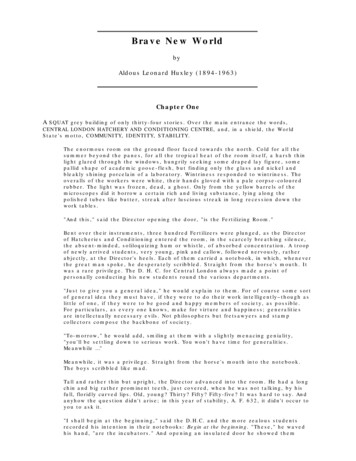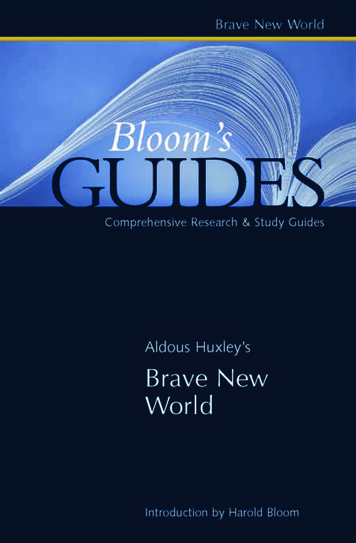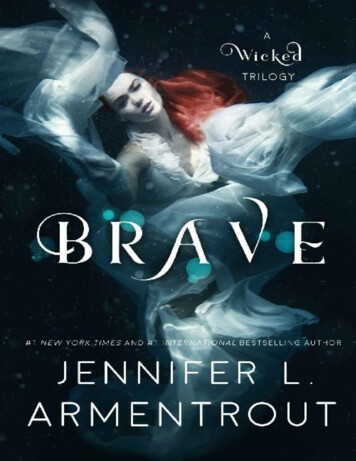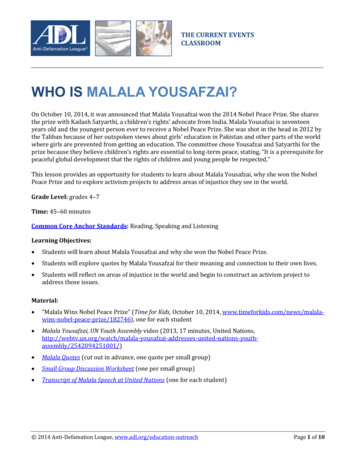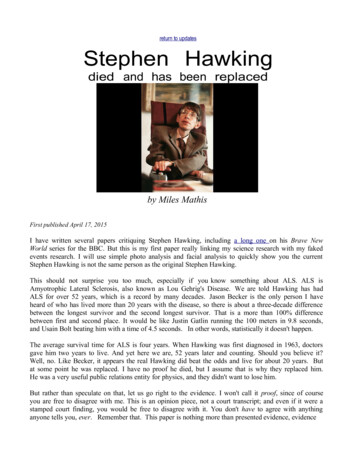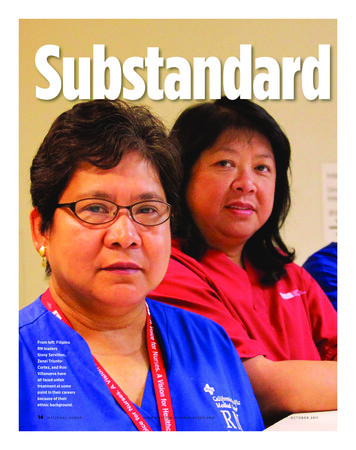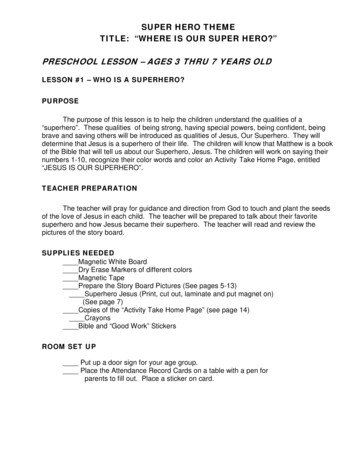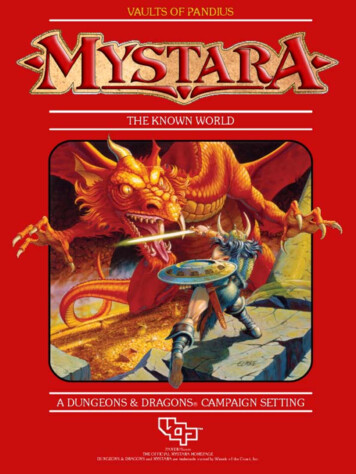
Transcription
Bloom’sGUIDESAldous Huxley’sBrave New WorldNew Edition
CURRENTLY AVAILABLEAdventures of Huckleberry FinnAll the Pretty HorsesAnimal FarmThe Autobiography of Malcolm XThe AwakeningThe Bell JarBelovedBeowulfBlack BoyThe Bluest EyeBrave New WorldThe Canterbury TalesCatch-22The Catcher in the RyeThe ChosenThe CrucibleCry, the Beloved CountryDeath of a SalesmanFahrenheit 451A Farewell to ArmsFrankensteinThe Glass MenagerieThe Grapes of WrathGreat ExpectationsThe Great GatsbyHamletThe Handmaid’s TaleHeart of DarknessThe House on Mango StreetI Know Why the Caged Bird SingsThe IliadInvisible ManJane EyreThe Joy Luck ClubThe Kite RunnerLord of the FliesMacbethMaggie: A Girl of the StreetsThe Member of the WeddingThe MetamorphosisNative SonNight1984The OdysseyOedipus RexOf Mice and MenOne Hundred Years of SolitudePride and PrejudiceRagtimeA Raisin in the SunThe Red Badge of CourageRomeo and JulietThe Scarlet LetterA Separate PeaceSlaughterhouse-FiveSnow Falling on CedarsThe StrangerA Streetcar Named DesireThe Sun Also RisesA Tale of Two CitiesTheir Eyes Were Watching GodThe Things They CarriedTo Kill a MockingbirdUncle Tom’s CabinThe Waste LandWuthering Heights
Bloom’sGUIDESAldous Huxley’sBrave New WorldNew EditionEdited & with an Introductionby Harold Bloom
Bloom’s Guides: Brave New World—New EditionCopyright 2011 by Infobase PublishingIntroduction 2011 by Harold BloomAll rights reserved. No part of this book may be reproduced or utilizedin any form or by any means, electronic or mechanical, includingphotocopying, recording, or by any information storage or retrievalsystems, without permission in writing from the publisher. Forinformation contact:Bloom’s Literary CriticismAn imprint of Infobase Publishing132 West 31st StreetNew York NY 10001Library of Congress Cataloging-in-Publication DataAldous Huxley’s Brave new world / edited and with an introduction byHarold Bloom. — New ed.p. cm. — (Bloom’s guides)Includes bibliographical references and index.ISBN 978-1-60413-878-8 (hardcover)ISBN 978-1-4381-3600-4 (e-book)1. Huxley, Aldous, 1894–1963. Brave new world. 2. Dystopias inliterature. I. Bloom, Harold.PR6015.U9B67245 2010823’.912—dc222010028994Bloom’s Literary Criticism books are available at special discounts whenpurchased in bulk quantities for businesses, associations, institutions, orsales promotions. Please call our Special Sales Department in New Yorkat (212) 967–8800 or (800) 322–8755.You can find Bloom’s Literary Criticism on the World Wide Web athttp://www.chelseahouse.comContributing editor: Portia Williams WeiskelCover designed by Takeshi TakahashiComposition by IBT Global, Troy NYCover printed by IBT Global, Troy NYBook printed and bound by IBT Global, Troy NYDate printed: December 2010Printed in the United States of America10 9 8 7 6 5 4 3 2 1This book is printed on acid-free paper.All links and Web addresses were checked and verified to be correct atthe time of publication. Because of the dynamic nature of the Web, someaddresses and links may have changed since publication and may nolonger be valid.
ContentsIntroductionBiographical SketchThe Story Behind the StoryList of CharactersSummary and AnalysisCritical ViewsRudolf B. Schmerl on Creating FantasyCristie L. March on the Place of Women in Brave NewWorldRobert L. Mack on Elements of Parody in BraveNew WorldCass R. Sunstein on Huxley and George Orwell’sContrasting Views of Love and SexRichard A. Posner on the Novel’s Distortion ofContemporary SocietyCarey Snyder on Huxley’s and D.H. Lawrence’sUse of the PastJohn Coughlin on Brave New World and Ralph Ellison’sInvisible ManDavid Garrett Izzo on the Novel’s Influence andMeaningColeman Carroll Myron on Escape Routes inthe NovelScott Peller on “Fordism” in Brave New WorldWorks by Aldous HuxleyAnnotated 196969737582869196100104110118121123125127
IntroductionHAROLD BLOOMIn his foreword to a 1946 edition of Brave New World (1931),Aldous Huxley expressed a certain regret that he had writtenthe book when he was an amused, skeptical aesthete rather thanthe transcendental visionary he had since become. Fifteen yearshad brought about a world in which there were “only nationalistic radicals of the right and nationalistic radicals of the left,”and Huxley surveyed a Europe in ruins after the completionof the Second World War. Huxley himself had found refuge inwhat he always was to call “the Perennial Philosophy,” the religion that is “the conscious and intelligent pursuit of man’s FinalEnd, the unitive knowledge of the immanent Tao or Logos,the transcendent godhead or Brahman.” As he sadly remarked,he had given his protagonist, the Savage, only two alternatives:to go on living in the Brave New World whose god is Ford(Henry), or to retreat to a primitive Indian village, more humanin some ways, but just as lunatic in others. The poor Savagewhips himself into the spiritual frenzy that culminates with hishanging himself. Despite Huxley’s literary remorse, it seems tome just as well that the book does not end with the Savage savinghimself through a mystical contemplation that murmurs “Thatare Thou” to the Ground of all being.Sixty-five years after Huxley’s foreword, Brave New Worldis at once a bit threadbare, considered strictly as a novel, andmore relevant than ever in the era of genetic engineering, virtual reality, and the computer hypertext. Cyberpunk sciencefiction has nothing to match Huxley’s outrageous inventions,and his sexual prophecies have been largely fulfilled. A newtechnology founded almost entirely on information rather thanproduction, at least for the elite, allies Mustapha Mond andNewt Gingrich, whose orphanages doubtless could have beengeared to the bringing up of Huxley’s “Bokanovsky groups.”Even Huxley’s intimation that “marriage licenses will be sold7
like dog licenses, good for a period of twelve months” wasbeing seriously considered in California not so long ago. Itis true that Huxley expected (and feared) too much from the“peaceful” uses of atomic energy, but that is one of his few failures in secular prophecy. The god of the Christian Coalitionmay not exactly be Our Ford, but he certainly is the god whoseworship assures the world without end of Big Business.Rereading Brave New World for the first time in severaldecades, I find myself most beguiled by the Savage’s passionfor Shakespeare, who provides the novel with much more thanits title. Huxley, with his own passion for Shakespeare, wouldnot have conceded that Shakespeare could have providedthe Savage with an alternative to a choice between an insaneutopia and a barbaric lunacy. Doubtless, no one ever has beensaved by reading Shakespeare or by watching him performed,but Shakespeare, more than any other writer, offers a possiblewisdom as well as an education in irony and the powers of language. Huxley wanted his Savage to be a victim or scapegoat,quite possibly for reasons that Huxley himself never understood. Brave New World, like Huxley’s earlier and better novelsAntic Hay and Point Counter Point, is still a vision of T.S. Eliot’sThe Waste Land, of a world without authentic belief and spiritual values. The author of Heaven and Hell and the anthologistof The Perennial Philosophy is latent in Brave New World, whoseSavage dies in order to help persuade Huxley himself that heneeds a reconciliation with the mystical Ground of all being.8
Biographical SketchAldous Leonard Huxley was born on July 6, 1894, inGodalming in Surrey, England. He came from a family of distinguished scientists and writers: His grandfather was ThomasHenry Huxley, the great proponent of evolution, and hisbrother was Julian Sorrell Huxley, who became a leading biologist. Aldous attended the Hillside School in Godalming andthen entered Eton in 1908, but he was forced to leave in 1910when he developed a serious eye disease that left him temporarily blind. In 1913, he partially regained his sight and enteredBalliol College, Oxford.Around 1915, Huxley became associated with a circleof writers and intellectuals who gathered at Lady OttolineMorell’s home, Garsington Manor House, near Oxford; therehe met T.S. Eliot, Bertrand Russell, Osbert Sitwell, and otherfigures. After working briefly in the War Office, Huxley graduated from Balliol in 1918 and the next year began teachingat Eton. He was, however, not a success there and decided tobecome a journalist. Moving to London with his wife, MariaNys, a Belgian refugee whom he had met at Garsington andmarried in 1919, Huxley wrote articles and reviews for the Athenaeum under the pseudonym Autolycus.Huxley’s first two volumes were collections of poetry, butit was his early novels—Crome Yellow (1921), Antic Hay (1923),and Those Barren Leaves (1925)—that brought him to prominence. By 1925, he had also published three volumes of shortstories and two volumes of essays. In 1923 Huxley and hiswife and son moved to Europe, where they traveled widelyin France, Spain, and Italy. A journey around the world in1925–26 led to the travel book Jesting Pilate (1926), just as alater trip to Central America produced Beyond the Mexique Bay(1934). Point Counter Point (1928) was hailed as a landmarkin its incorporation of musical devices into the novel form.Huxley developed a friendship with D. H. Lawrence, and from1926 until Lawrence’s death in 1930, Huxley spent much time9
looking after him during his illness with tuberculosis; in 1932he edited Lawrence’s letters.In 1930, Huxley purchased a small house in Sanary, insouthern France. It was there that he wrote one of his mostcelebrated works, Brave New World (1932), a negative utopianor “dystopian” tale that depicted a nightmarish vision of thefuture in which science and technology are used to suppresshuman freedom.Huxley became increasingly concerned about the state ofcivilization as Europe lurched toward war in the later 1930s:He openly espoused pacifism and (in part through the influence of his friend Gerald Heard) grew increasingly interestedin mysticism and Eastern philosophy. These tendencies wereaugmented when he moved to Southern California in 1937.With Heard and Christopher Isherwood, Huxley formed theVedanta Society of Southern California, and his philosophy wasembodied in such volumes as The Perennial Philosophy (1945)and Heaven and Hell (1956).During World War II, Huxley worked as a scenarist in Hollywood, writing the screenplays for such notable films as Prideand Prejudice (1941) and Jane Eyre (1944). This experience leddirectly to Huxley’s second futuristic novel, Ape and Essence(1948), a misanthropic portrait of a postholocaust societywritten in the form of a screenplay.In California, Huxley associated with Buddhist and Hindugroups, and in the 1950s he experimented with hallucinogenicdrugs such as LSD and mescaline, which he wrote about in TheDoors of Perception (1954). Brave New World Revisited (1958),a brief treatise that discusses some of the implications of hisearlier novel, extended the author’s pessimism about futuresociety, particularly in the matters of overpopulation and thethreat of totalitarianism. But in Island (1962)—the manuscriptthat Huxley managed to save when a brush fire destroyed hishome and many of his papers in 1961—he presents a positiveutopia in which spirituality is developed in conjunction withtechnology.Late in life, Huxley received many honors, including anaward from the American Academy of Letters in 1959 and10
election as a Companion of Literature of the British RoyalSociety of Literature in 1962. His wife died in 1955, and thenext year he married Laura Archera, a concert violinist. AldousHuxley died of cancer of the tongue on November 22, 1963,the same day as John F. Kennedy and C.S. Lewis.11
The Story Behind the StoryAldous Huxley’s decision to merge science with literatureseems an obvious choice when one considers his heritage. Hewas born in 1894 in Surrey, England, and his father, LeonardHuxley, was editor of Cornhill magazine, a literary journalthat published authors such as George Eliot; Thomas Hardy;Alfred, Lord Tennyson; and Robert Browning. His mother,Julia Arnold, was the niece of the poet Matthew Arnold, andher sister, Mary Humphrey Ward, was a popular novelist in herown right. Huxley’s grandfather was the famous biologist T. H.Huxley, Charles Darwin’s disciple and protégé.As it was proper for the son of two such distinguished intellectual families, Huxley attended Eton with the hopes of following in the footsteps of his grandfather and elder brotherJulian by becoming a doctor and scientist. Such dreams weredashed when Huxley was 16, as he contracted a serious diseasethat left him completely blind for two years and seriously damaged his vision for the rest of his life. Huxley changed careerpaths and in 1916 received his undergraduate degree in literature from Balliol College, Oxford.Huxley began writing professionally in 1920 for variousmagazines and published his first novel, Crome Yellow, in 1920at the age of 26. His satirical voice was well-received, andhe went on to publish several more novels, producing PointCounter Point in 1928, establishing himself as a best-sellingauthor. Although it has not been Huxley’s most enduring novel,many critics believe Point Counter Point to be his most ambitious and successful work. It was on the heels of this successthat Huxley produced Brave New World.Brave New World sold 13,000 copies in England in its firstyear, 3,000 more than Point Counter Point. Although the novelwas a success in terms of sales, reviews were uniformly negative. Because it was a departure from his previously lively,“carnivalesque” style, critics accused Brave New World of beingdry, boring, and overly simplistic. His vision of the future wasseen as interesting but irrelevant and unoriginal. In his journal12
Books, M. C. Dawson called the novel “a lugubrious and heavyhanded piece of propaganda.” Illustrating the attitude of manyreviewers, the following is an excerpt from the New Statesmanand Nation:[T]his squib about the future is a thin little joke,epitomized in the undergraduate jest of a civilization datedA.F., and a people who refer reverently to ‘our Ford’—nota bad little joke, and what it lacks in richness Mr. Huxleytries to make up by repetition; but we want rather moreto a prophecy than Mr. Huxley gives us. . . . The factis Mr. Huxley does not really care for the story—theidea alone excites him. There are brilliant, sardonic littlesplinters of hate aimed at the degradation he has foreseenfor our world; there are passages in which he elaboratesconjectures and opinions already familiar to readers of hisessays. . . . There are no surprises in it; and if he had nosurprises to give us, why should Mr. Huxley have botheredto turn this essay in indignation into a novel?The reviewer finds “prophecy” in Huxley’s novel and isdisappointed with the simplicity of it. But Huxley insisted thatBrave New World was not a prophetic novel but a cautionaryone. He saw the rapid changes that scientific advancement wasallowing in his society and, aided by a strong scientific background, imagined how much further it might go. In a 1962interview, Huxley defends his purpose in writing the novel:[Technology could] iron [humans] into a kind ofuniformity, if you were able to manipulate their geneticbackground . . . if you had a government unscrupulousenough you could do these things without any doubt. . . .We are getting more and more into a position wherethese things can be achieved. And it’s extremely importantto realize this, and to take every possible precaution to seethey shall not be achieved. This, I take it, was the messageof the book—This is possible: for heaven’s sake be carefulabout it.13
Another complaint was Huxley’s “preoccupation with sexuality.” The promiscuity of Huxley’s futuristic society, and theease with which he discusses it, was shocking and disturbing.A reviewer from London’s Times Literary Supplement wrote, “itis not easy to become interested in the scientifically imagineddetails of life in this mechanical Utopia. Nor is there compensation in the amount of attention that [Huxley] gives to theabundant sex life of these denatured human beings.”Huxley composed Brave New World in 1931, when Europeand America were still reeling—economically, politically, andsocially—from World War I. Massive industrialization, coupled with severe economic depression and the rise of fascism,were the backdrop for the novel. It was this turbulence thatinformed Huxley’s cautionary vision of the future. But themassive destruction of World War II was yet to be seen, andHuxley’s imagined history of the Nine Years’ War and the persecution that followed might have seemed a bit fantastical.A decade later, the strength of totalitarian states such asNazi Germany and the Soviet Union, coupled with the terrorof World War II, radically changed the world’s vision of futurepossibilities. Huxley’s warning of an all-powerful governmentwas more relevant than Dawson thought in 1932. In the secondhalf of the twentieth century, advances in biology were so vastthat a eugenic society became more than a mad Englishman’sfar-fetched fantasy. And today, with the development of successful experiments in cloning, Huxley’s tale of caution hassomehow morphed into one of prophecy. Even Huxley, in hisintroduction to a 1946 edition of Brave New World, admits:All things considered it looks as though Utopia werefar closer to us than anyone, only fifteen years ago,could have imagined. Then, I projected it six hundredyears into the future. Today it seems quite possible thatthe horror may be upon us within a single century. . . .Indeed, unless we choose to decentralize and to useapplied science, not as the end to which human beingsare to be made the means, but as the means to producinga race of free individuals, we have only two alternatives14
to choose from: either a number of national, militarizedtotalitarianisms, having as their root the terror of theatomic bomb and as their consequence the destruction ofcivilization . . . or else one supranational totalitarianism,called into existence by the social chaos resulting fromrapid technological progress in general and the atomicrevolution in particular, and developing, under the needfor efficiency and stability, into the welfare-tyranny ofUtopia. You pays your money and you takes your choice.Each decade brings its technological advances, and theseadvances inexorably alter the social fabric of the world. PerhapsHuxley’s guesses were simply lucky, but his utopia seems closerevery day. This ability of Brave New World to become more relevant as time passes accounts for its continual popularity, bothas a period piece and as an ever-modern novel.15
List of CharactersThe Director of Hatcheries and Conditioning for CentralLondon is the head of the Central Hatchery, where many ofthe characters work and much of the narrative takes place. Heintroduces the reader to the facility and the fundamentals ofHuxley’s futuristic society. It is the director’s accident whilevisiting the Savage Reservation years earlier that provides theimpetus for the second half of the novel.Henry Foster is one of Lenina’s boyfriends and accompaniesthe director on the student tour of the Central Hatchery andConditioning Centre in the first section of the novel. He servesas a counterpoint to Bernard Marx—where Bernard is antisocial, eccentric, and individual, Henry is the model conditionedcitizen.Lenina Crowne works in the Central Hatchery and Conditioning Centre and accompanies Bernard to the Savage Reservation in New Mexico. Her beauty attracts John, and shebecomes the object of his romantic and possessive love. Sheserves as the liaison between civilized and savage society, asshe feels a strong connection for John but is confused by whatseems to be a growing predilection for monogamy and love.John’s attraction to her, and her inability to abandon the promiscuous dictates of her conditioning, serves as a major conflictduring John’s visit to London.Mustapha Mond is one of 10 World Controllers, and hissphere of influence includes England. His position as one ofthe major upholders of conditioned society is complicated byhis understanding of the sacrifice necessary for such a strictsociety; his secret stash of forbidden religious and literary texts,as well as his personal history as a young man faced with exileor the renunciation of his pursuit of knowledge, demonstratethat individual awareness has not been eradicated in the “civilized” world but merely suppressed.16
Bernard Marx is an example of unsuccessful, or incomplete,conditioning. Perhaps due to an accident of his conditioningwhile he was still “bottled,” Bernard is physically imperfect,melancholy, and dissatisfied with life in London. Rather thanregularly taking soma and engaging in state-supervised entertainment, he complains about London’s lack of individualityand feels an outsider in a society that purports to abolish selfconsciousness. He is responsible for bringing John and Lindato London and is finally exiled as a result of his predilection forcriticism of the state.Fanny Crowne also works in the Conditioning Centre andis Lenina’s friend. She serves as a warning voice when Leninaexhibits a desire for monogamy, first with Henry Foster andlater with John. When Lenina considers the strange passionshe feels for John, Fanny counsels her to date and sleep withhim and explains Lenina’s surprising depression as evidencethat she needs a Violent Passion Surrogate. Like Henry, Fannyis a model citizen and cannot contemplate behaving against herconditioning.Helmholtz Watson feels like an outsider in conditionedsociety. He writes propaganda for several state-sanctioned publications but longs to write something more meaningful andpassionate. He immediately befriends John and is enthralledby the forbidden writings of Shakespeare (which John revealsto him). Like Bernard, he is ultimately exiled by Mond to theFalkland Islands, where he can pose no threat to the stability ofconditioned society; unlike Bernard, Helmholtz anticipates hisexile as an opportunity to escape the limited society of Londonand looks forward to having the freedom to explore his individuality in writing.Linda is the Beta Minus who accompanies the Director to theSavage Reservation decades before the novel’s time frame. Sheis lost during a storm and is left in New Mexico, where she isrescued by an Indian tribe. She is pregnant at the time of heraccident, and without the availability of London’s abortion17
centres, is forced to viviparously give birth to the son of theDirector. She never fully adjusts to uncivilized life and struggles to adapt her conditioned mind to unconditioned society.John is the son of Linda and the Director, born on the SavageReservation. He presents a unique problem, as he is the son(in itself, an abomination) of a conditioned woman who triesto condition him as best she can outside of the technologyof London, but he is raised in an unconditioned society. Theresult is John’s inability to complete identify or fit into eitherworld. This becomes clear when he accompanies Bernard toLondon and is viewed as sideshow entertainment, both fascinating and foreign because of his tendency to form passionateand monogamous attachments to his mother and Lenina. Civilized society has no place for the uncivilized, but neither doesthe Savage Reservation have a place for someone born to a civilized woman. His lack of place, and therefore lack of identity, isone of the major themes of the novel.18
Summary and AnalysisThe novel opens at the main entrance of the Central LondonHatchery and Conditioning Centre, over which is emblazonedthe motto of the World State: “Community, Identity, Stability.” This echoes in form, yet contradicts in meaning, themotto of the French Revolution: “Liberty, Equality, Fraternity.” Immediately the reader is aware that this story is tobe an ironic one, and the world in which it is set is not of thedemocratic vision fought for in late eighteenth-century France.The narrative begins as the Director of the Central Hatchery(never named beyond his title) leads a tour of young studentsthrough the facility in chapter 1. Huxley cleverly allows thereader an introduction to his futuristic world by allowing us tofollow the narrative from the perspective of one of these students. The Director conducts us through the whole facility inorder to give the students a general idea of the complete process of Hatching and Conditioning: “For of course some sort ofgeneral idea they must have, if they were to do their work intelligently—though as little of one, if they were to be good andhappy members of society, as possible. For particulars, as everyone knows, make for virtue and happiness; generalities areintellectually necessary evils. Not philosophers but fretsawyersand stamp collectors compose the backbone of society.”Huxley uses this tour as a realistic way to introduce thereader to the futuristic world he has created. The story takesplace in a.f. 632, corresponding to a.d. 2540 (a.f. standing for anew system of dating that is explained in chapter 3).The tour begins in the Fertilizing Room, where theDirector outlines the basic method of fertilization. Selectedwomen are paid the equivalent of six months’ salary to undergoan operation in which an ovary is excised and kept “alive andactively developing.” As such, the ovary will continue to produce eggs (ova) in its laboratory environment. Each egg iscarefully inspected for abnormalities, and if it passes scrutiny,it is then placed in a container with several other ova and isimmersed in a high concentration of spermatozoa. The eggs19
remain in the solution until each is fertilized, after which theyare all returned to the incubators.Here Huxley first introduces the idea of the caste system,seemingly based on the Indian system with which Huxley, as acitizen of the British Empire, would be quite familiar. Peoplebelong to one of five castes, Alpha being the most respectedand Epsilon being the least: Alpha, Beta, Gamma, Delta, orEpsilon (each caste is then divided into three stratums: forexample, Alpha Plus, Alpha, and Alpha Minus). Castes aredetermined before fertilization; Alpha and Beta ova remain intheir incubators until they are “bottled” (explained below), butGamma, Delta, and Epsilon ova are removed from their incubators so that they may undergo Bokanovsky’s Process. “Oneegg, one embryo, one adult—normality. But a bokanovskified egg will bud, will proliferate, will divide. From eight toninety-six buds, and every bud will grow into a full-sized adult.Making ninety-six human beings grow where only one grewbefore.” The Director explains to the students (and the reader):“Essentially bokanovskification consists of a series of arrests ofdevelopment. We check the normal growth and, paradoxicallyenough, the egg responds by budding.” Thus one fertilized eggproduces up to 96 identical twins.One student asks the Director what advantage bokanovskification provides. The Director explains that “Bokanovsky’sProcess is one of the major instruments of social stability!”Ideally, the entire working class would be composed of oneenormous Bokanovsky Group, giving an unheard-of stabilityto one’s identity and, by extension, to one’s society (recallthe planetary motto of “Community, Identity, Stability”).Originally, mass production of twins was hindered only bythe “ninety-six buds per ova” limit but also by the length oftime needed by an ovary to produce eggs. At a normal rate ofproduction, an ovary may produce 200 eggs over 30 years, butthe goal of mass production is to yield as many identical (ornearly identical) offspring as possible in the shortest amountof time. Podsnap’s Technique, allowing one ovary to produce150 mature eggs in only two years, quickens the process: “youget an average of nearly eleven thousand brothers and sisters20
in a hundred and fifty batches of identical twins, all withintwo years of the same age.”The narrator describes Bokanovsky’s Process as logical andrational: “The principle of mass production at last applied tobiology.” While this statement is not overtly judgmental oreven ironic, one must remember that Huxley wrote the novelin the early 1930s, just as industrialization was beginning toaffect and dominate the average man’s life. While it is dangerous to make too many assumptions about an author’s undocumented feelings about specific events, it is safe to assume thatany person living at that time would have been more than alittle anxious about the rapidly changing fabric of daily life. It isnot difficult to see how an imagination as active as Huxley’s wasable to take this common anxiety and the rate at which industrywas moving toward mass production and imagine the endpointof such “progress.” In many ways, Brave New World demonstrates the result of transplanting the growing ideals of massproduction onto humanity itself, rather than simply humanity’smachines. This is something to keep in mind throughout thenovel; the narrator’s opinion of the society that he describesbecomes more obvious as the story progresses.The Director introduces Henry Foster to the students andasks him to explain the record number of production for asingle ovary. Henry explains that London’s record is 16,012but that in tropical centers they have reached as high as 17,000.However, he is quick to point out that the “negro ovary”responds much faster to the process. The Director invitesHenry to join him in leading the students, and they move on tothe Bottling Room.Huxley describes the Bottling Room as a production line in afactory (indeed, his Hatchery and Conditioning Centre is littlemore than a factory that produces socialized humans). First, hedescribes the Liners: A device lifts “flaps of fresh sow’s peritoneum ready cut to the proper size” from the Organ Store,and the Liners take each flap and place it on the b
The Joy Luck Club The Kite Runner Lord of the Flies Macbeth Maggie: A Girl of the Streets The Member of the Wedding The Metamorphosis Native Son Night 1984 The Odyssey Oedipus Rex Of Mice and Men One Hundred Years of Solitude Pride and Prejudice Ragtime A Raisin in the Sun The Red Badge of C
